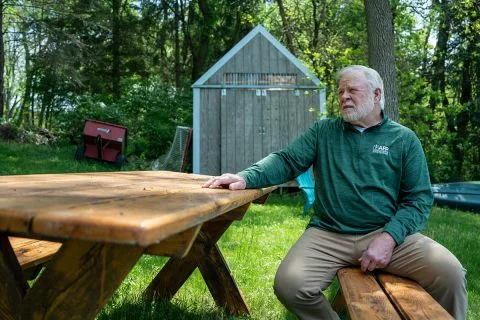Sometimes he worked late, driving home so intoxicated one time that he remembers being so confused — behind the wheel of his Honda Accord — that the road seemed to extend straight up to the sky.
“What’s it doing there?” He recalled asking himself.
And his patients?
His daughter, Angela, who was then in her 20s, was working for her father as a medical transcriptionist, listening to his taped voice describing patients and conditions. Something didn’t seem right.
“Those tapes really were concerning for me because he would be talking, and he’d … just kind of drift off,” she told Bridge last week.
She asked him about it one day.
“He just was like ‘yeah, you know — ‘just really late nights,’” she remembered him responding. “And I took it as the truth because I had no reason to think (otherwise).”
There had been no arrests, no traffic crashes — nothing that would otherwise indicate a drug problem. Her father and mother babysat her own two children often — a loving grandparent relationship.
And even when her doctor-father’s voice drifted off on tape, he’d edit it later — more clearly nailing the details of a patient’s case.
“He was a very high-functioning person,” said Dregansky’s daughter, Angela Lenhardt.
What headache?
It came to a halt on a workday in September 2003. One of Dregansky’s colleagues in passing had asked a patient about her headaches.
“What headaches?” she responded.
Speaking to Bridge, Dregansky shook his head at the memory.
“I was putting the names of real patients on the log as if they had received Demerol injections. That’s how I was scoring the Demerol,” he said.
His colleagues gave him an ultimatum: Tell your wife and get yourself into treatment, or you’re gone.
On Sunday, he sat down with Melodie.
Despite his odd behavior, his long hours at work, his avoiding her eyes and her presence in recent months — she was nonetheless shocked at his confession.
She had suspected an affair instead.
Their son, then 18, was “flabbergasted.”
Neal Dregansky knew his father — then and now still his “hero,” he notes — would have a cocktail at night. And Neal Dregansky was a typical teen — absorbed in his own life as a freshman at Michigan State University.
“But I will say that he obviously was an expert at hiding some of this stuff,” he told Bridge Monday.
Dregansky checked into a 28-day treatment program in Ohio in September, 2003. He quit cold turkey. Suffered, he said, the “hell” of withdrawal. Followed the rules, and submitted to drug tests.
Still, the 28-day program took him 77 days.
As any doctor will tell you of their patients: “Some are sicker than others,” he said.
‘Hope is fundamental’
Dregansky eventually returned to practicing medicine, submitting for years to counseling and drug tests.
He continued family medicine, earning his certification in addiction medicine at 67 years old.
He became director of the family medicine residency program at Western Michigan University Homer Stryker M.D. School of Medicine in Kalamazoo. In 2022, he was installed as president of the Michigan Academy of Family Medicine, vowing to make the circuit of the state’s medical residency programs, talking to newly minted doctors about addiction.
Dregansky tells them about his own story and about the third option behind prison and death. It’s the Michigan Health Professionals Recovery Program, which helps medical professionals find confidential treatment and, if successful, allows them to retain their license.
Established in 1994, the state program covers doctors and health professionals in fields from acupuncture to veterinary medicine. Users can contact the program directly for help. If someone, including a colleague, reports them, the professional has 24 hours to respond. Those who fail to do so, or fail to complete treatment, can lose their license.
It’s difficult enough to recognize one’s own substance use disorder, Dregansky and others said. For doctors, especially, it’s harder still to seek treatment.
“There’s this fear that if I am depressed, or if I’m drinking too much, or if I become dependent on opioids, that I’m going to lose my license, my livelihood, my career,” said Dr. Kristi VanDerKolk, an assistant professor and director of the family medicine residency program at Western Michigan University Homer Stryker M.D. School of Medicine.



